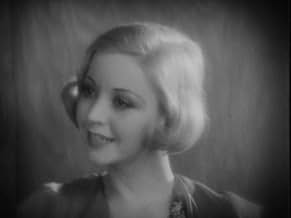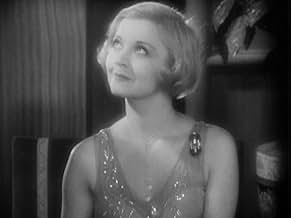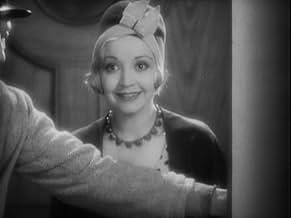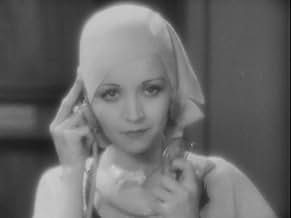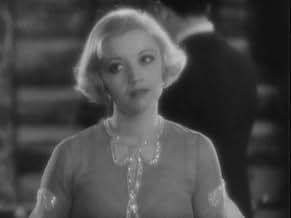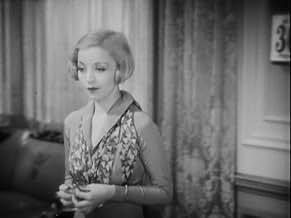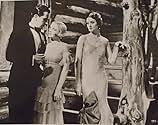Rich party girl sets her eyes on a young attorney.Rich party girl sets her eyes on a young attorney.Rich party girl sets her eyes on a young attorney.
- Director
- Writers
- Stars
Sayre Dearing
- Kay's Friend
- (uncredited)
Geraldine Dvorak
- Party Guest
- (uncredited)
Jay Eaton
- Party Guest
- (uncredited)
Adolph Faylauer
- Party Guest
- (uncredited)
Dick Gordon
- Party Guest
- (uncredited)
Thelma Hill
- Friend
- (uncredited)
Lloyd Ingraham
- Judge Drake
- (uncredited)
Jane Keckley
- Office Cleaning Woman
- (uncredited)
Fred Kelsey
- Policeman
- (uncredited)
Marian Marsh
- Kay's Friend
- (uncredited)
- Director
- Writers
- All cast & crew
- Production, box office & more at IMDbPro
Featured reviews
Minor but amusing comedy starring that little kewpie doll, Alice White.
For a few years in the late 20s and early 30s White was a big name and starred in a series of comedies and musicals.
In THE NAUGHTY FLIRT she plays a spoiled rich girl who travels in a fast set of country club kids. She runs across a staid lawyer in night court when the "gang" has been hauled in for disturbing the peace at a local dive. He works in her father's law firm.
Because he ignores her she floods him with invitations and finally lures him to a party where he continues to ignore her and pay attention to her rival, Myrna Loy. Of course this drive the little flirt crazy. The "Cinderella Dance" is interesting to say the least.
Myrna and her brother are almost broke (it's 1931) and they have a scheme for him to marry White with her $100,000/year income. So there are some more complications before the final clinch.
Alice White was the Goldie Hawn of her day, a delightful actress who could sing a little and dance a little. She was a rival to Clara Bow and was probably the last of the flappers. She's very good in this comedy. Myrna Loy has fun as the bitchy rival who schemes for money. Paul Page (looking like Fredric March) plays the lawyer. Robert Agnew is Wilbur, George Irving is the father, Douglas Gilmore is Jack, Fred Kelsey is the cop, and Lloyd Ingraham is the judge.
Cute film.
For a few years in the late 20s and early 30s White was a big name and starred in a series of comedies and musicals.
In THE NAUGHTY FLIRT she plays a spoiled rich girl who travels in a fast set of country club kids. She runs across a staid lawyer in night court when the "gang" has been hauled in for disturbing the peace at a local dive. He works in her father's law firm.
Because he ignores her she floods him with invitations and finally lures him to a party where he continues to ignore her and pay attention to her rival, Myrna Loy. Of course this drive the little flirt crazy. The "Cinderella Dance" is interesting to say the least.
Myrna and her brother are almost broke (it's 1931) and they have a scheme for him to marry White with her $100,000/year income. So there are some more complications before the final clinch.
Alice White was the Goldie Hawn of her day, a delightful actress who could sing a little and dance a little. She was a rival to Clara Bow and was probably the last of the flappers. She's very good in this comedy. Myrna Loy has fun as the bitchy rival who schemes for money. Paul Page (looking like Fredric March) plays the lawyer. Robert Agnew is Wilbur, George Irving is the father, Douglas Gilmore is Jack, Fred Kelsey is the cop, and Lloyd Ingraham is the judge.
Cute film.
What a delightful little bit of pre-Code confectionery this is. Alice White is simply adorable, there are lots of playful moments, and Myrna Loy schemes in a supporting role. White plays the wild child of a rich lawyer, partying late and having romances with a lot of different men. When she's on the verge of marrying one of them on the spur of the moment, he has one of his employees (Paul Page) get her out of there. The two of them hit it off, but face challenges in not only her playgirl past, but also in a brother/sister duo (Douglas Gilmore and Myrna Loy) plotting to have Gilmore marry her for her money.
The innuendo in this film is pretty innocent, but as in other pre-Code films, I like the acknowledgement of women's sexuality. That has an honesty about that, even if it was also meant to sell tickets. The plot is simple and the run-time is a brisk 56 minutes, but to me that was a good thing. The flapper scenes - being hauled in by the police after a late night party, with playful defiance of authority in the dialogue - were entertaining. The party scenes - the 'Cinderella dance', and then later dancing the night away to forget heartache - were as well. The clothing, hats, and cars are all beautiful. It's White's movie, but the scene where Loy hatches a scheme to get Page up into her room and into a compromising position is a good one.
In a scene that may define whether you'll like or dislike this movie, White gets a spanking from Page when he discovers she'd made a bet that she could get him to go home with her before midnight, and that she has a history of doing that kind of thing. I found it an amusing little window into the period as the tone was light, then literally laughed out loud at the intertitle which followed, which said "A good old fashioned spanking was the turning point in the life of an ultra-modern girl." However, if that sort of thing is likely to bother you, I'd recommend skipping this film. On the other hand, if you like Alice White, or pre-Code silliness in general, you'll probably like it enough to warrant spending an hour.
The innuendo in this film is pretty innocent, but as in other pre-Code films, I like the acknowledgement of women's sexuality. That has an honesty about that, even if it was also meant to sell tickets. The plot is simple and the run-time is a brisk 56 minutes, but to me that was a good thing. The flapper scenes - being hauled in by the police after a late night party, with playful defiance of authority in the dialogue - were entertaining. The party scenes - the 'Cinderella dance', and then later dancing the night away to forget heartache - were as well. The clothing, hats, and cars are all beautiful. It's White's movie, but the scene where Loy hatches a scheme to get Page up into her room and into a compromising position is a good one.
In a scene that may define whether you'll like or dislike this movie, White gets a spanking from Page when he discovers she'd made a bet that she could get him to go home with her before midnight, and that she has a history of doing that kind of thing. I found it an amusing little window into the period as the tone was light, then literally laughed out loud at the intertitle which followed, which said "A good old fashioned spanking was the turning point in the life of an ultra-modern girl." However, if that sort of thing is likely to bother you, I'd recommend skipping this film. On the other hand, if you like Alice White, or pre-Code silliness in general, you'll probably like it enough to warrant spending an hour.
.... that showcases her comedic skills and vibrant personality is eventually sunk by poor script and blah costar Paul Page (who resembles Fredric March). Miss White and Myrna Loy, however, are fun. White was saddled with lousy scripts in her brief starring career. She could have and should have been a rival to Clara Bow or Jean Harlow. She was terrific in Employees' Entrance but continued to slide anyway. Such is Hollywood. Catch her in Show Girl in Hollywood---she's good in that one too!!
"The Naughty Flirt" is a delightful period piece that evokes the (relatively) care-free life many of the very rich maintained even in aftermath of the 1929 stock market crash.
Alice White plays the spoiled socialite Miss Katherine 'Kay' Elliott and does a very charming comic turn. This is a Pre-Code film in which the figures of all the female beauties are provocatively shown off in revealing attire in the party scenes. While the sex - including a somewhat surprising spanking scene - is played up, the prohibition age drinking is can only be suggested.
The film starts with a gay gang of young socialites in the back of a Police Paddy Wagon headed to the police station to be booked on creating a public nuisance. It seems pretty obvious they've all been drinking as well as dancing at a riotous rooftop party.
White as Kay is quite the unflappable flapper, a Daddy's girl with an income of $100,000 a year. Imagine what that could buy in 1931! She's been kicked out of every fine private school her father could get her into and is the dedicated decadent until her world is turned around by a straight-laced country-boy-turned lawyer who happens to work for her Dad's firm.
It's a classic case of opposites attract - with a dash of Taming of the Shrew. The two are instantly drawn to each other starting when the lawyer, Alan Ward (Paul Page), - studiously attending a session of night court at the police station - first lays eyes on the naughty platinum blonde.
Their romance is tested by a scheme masterminded by Linda Gregory (Myrna Loy) and her brother Jack (Douglas Gilmore) who wants to marry her for money. These dark characters hope to recover from the loss of their fortune in the stock market crash.
There are also trust issues as regular guy Alan attempts to gage the loyalty of this 'belle of the ball' while taking stock of her seemingly countless admirers.
I saw this on TCM which has a very high technical standard. I'm always impressed at how quickly sound movies progressed. Just four years into the sound era, there's a scene with a wax cylinder Dictaphone in which we listen in as White puts on headphones and hears the recording of Alan speaking for dictation and then get sidetracked into another far more personal conversation with a friend drops into his office unexpectedly. The sound is played back in the scratchy Dictaphone mode - differentiating it from the regular sound.
This is a fun and funny story, providing a glimpse into a fascinating age (especially if you were rich) where Jazz Age attitudes intersected with an elite American Anglophile culture.
Alice White plays the spoiled socialite Miss Katherine 'Kay' Elliott and does a very charming comic turn. This is a Pre-Code film in which the figures of all the female beauties are provocatively shown off in revealing attire in the party scenes. While the sex - including a somewhat surprising spanking scene - is played up, the prohibition age drinking is can only be suggested.
The film starts with a gay gang of young socialites in the back of a Police Paddy Wagon headed to the police station to be booked on creating a public nuisance. It seems pretty obvious they've all been drinking as well as dancing at a riotous rooftop party.
White as Kay is quite the unflappable flapper, a Daddy's girl with an income of $100,000 a year. Imagine what that could buy in 1931! She's been kicked out of every fine private school her father could get her into and is the dedicated decadent until her world is turned around by a straight-laced country-boy-turned lawyer who happens to work for her Dad's firm.
It's a classic case of opposites attract - with a dash of Taming of the Shrew. The two are instantly drawn to each other starting when the lawyer, Alan Ward (Paul Page), - studiously attending a session of night court at the police station - first lays eyes on the naughty platinum blonde.
Their romance is tested by a scheme masterminded by Linda Gregory (Myrna Loy) and her brother Jack (Douglas Gilmore) who wants to marry her for money. These dark characters hope to recover from the loss of their fortune in the stock market crash.
There are also trust issues as regular guy Alan attempts to gage the loyalty of this 'belle of the ball' while taking stock of her seemingly countless admirers.
I saw this on TCM which has a very high technical standard. I'm always impressed at how quickly sound movies progressed. Just four years into the sound era, there's a scene with a wax cylinder Dictaphone in which we listen in as White puts on headphones and hears the recording of Alan speaking for dictation and then get sidetracked into another far more personal conversation with a friend drops into his office unexpectedly. The sound is played back in the scratchy Dictaphone mode - differentiating it from the regular sound.
This is a fun and funny story, providing a glimpse into a fascinating age (especially if you were rich) where Jazz Age attitudes intersected with an elite American Anglophile culture.
Alice White was an adorable flapper, whose career was over before it started. She was First National's answer to Clara Bow but she didn't have the longevity of the red headed "It" girl. 1931 started with "The Naughty Flirt", one of her best films and ended with "Murder at Midnight", in which, although billed prominently, she was only given about two decent scenes.
The plot is 60 minutes of frivolous fun with White doing what she does best - being adorably flirty and making every man her slave. When Kay (Alice White) and her gang are hauled into night court for disorderly conduct, she meets Alan Ward (Paul Page) an associate with her father's law firm and it doesn't take him long to fall under her spell. She already has a persistent suitor in Jack Gregory (Douglas Gilmore) who is always asking Kay to marry him. He, along with his scheming sister, Linda (Myrna Loy) have ulterior motives - they have been wiped out in the stock market crash and hope that if Jack can marry Kay their financial worries will be at an end.
The "Cinderella Dance" is one of the film's highlights - all the girls take off one of their shoes, put it in the middle of the ballroom and then the boys have to pick one and dance with it's owner. White, who made her name with a couple of excellent musicals from the early talkie era ("Broadway Babies" (1929) and "Show Girl in Hollywood" (1930)) is not asked to sing or dance here which is a pity. She also gets a run for her money from Myrna Loy as the sultry Linda. Why it took so long for Loy to "make it" (1933's "Animal Kingdom" was her big break) is one of Hollywood's real mysteries. However White's cutie pie acting wins through - she is impossible to resist.
Although she had a very hectic private life, maybe what happened to Alice White were films like "The Naughty Flirt". 1931 was one of the worst years of the depression and with a title like "The Naughty Flirt", reminiscent of a jazzy, carefree past, the movie going public may have been turned off. In this year of unemployment and breadlines, if films started out with scenes of high living ("Bad Company" and "Dance Fools, Dance") audiences wanted to see stars really suffer before realising that the simple life was the best.
Highly Recommended.
The plot is 60 minutes of frivolous fun with White doing what she does best - being adorably flirty and making every man her slave. When Kay (Alice White) and her gang are hauled into night court for disorderly conduct, she meets Alan Ward (Paul Page) an associate with her father's law firm and it doesn't take him long to fall under her spell. She already has a persistent suitor in Jack Gregory (Douglas Gilmore) who is always asking Kay to marry him. He, along with his scheming sister, Linda (Myrna Loy) have ulterior motives - they have been wiped out in the stock market crash and hope that if Jack can marry Kay their financial worries will be at an end.
The "Cinderella Dance" is one of the film's highlights - all the girls take off one of their shoes, put it in the middle of the ballroom and then the boys have to pick one and dance with it's owner. White, who made her name with a couple of excellent musicals from the early talkie era ("Broadway Babies" (1929) and "Show Girl in Hollywood" (1930)) is not asked to sing or dance here which is a pity. She also gets a run for her money from Myrna Loy as the sultry Linda. Why it took so long for Loy to "make it" (1933's "Animal Kingdom" was her big break) is one of Hollywood's real mysteries. However White's cutie pie acting wins through - she is impossible to resist.
Although she had a very hectic private life, maybe what happened to Alice White were films like "The Naughty Flirt". 1931 was one of the worst years of the depression and with a title like "The Naughty Flirt", reminiscent of a jazzy, carefree past, the movie going public may have been turned off. In this year of unemployment and breadlines, if films started out with scenes of high living ("Bad Company" and "Dance Fools, Dance") audiences wanted to see stars really suffer before realising that the simple life was the best.
Highly Recommended.
Did you know
- Quotes
Invitation: Miss Kay Elliott / requests the honor of your presence / at an informal party given / in Honor of her Annual Expulsion / from Miss Baynor's Select School / for Young Ladies // Embassy Roof / Saturday May third / ten P. M. until?---
- SoundtracksUntitled Song
(uncredited)
Composer unknown (probably Sam H. Stept)
Played during the opening credits and often as background music
Played as dance music at the country club and sung ("I often wonder if you cared ...") by an unidentified trio
Hummed by Paul Page
Details
- Runtime
- 56m
- Color
Contribute to this page
Suggest an edit or add missing content

